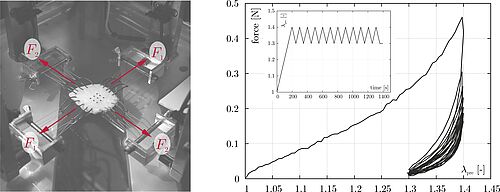
German Research Foundation (DFG) - Project number: 514952469

The urinary bladder and the stomach are examples of organs whose walls contain smooth muscle tissue. Smooth muscles are very different from traditional engineering materials and enable the organs to function irrespective of their fill-level and current shape.
From a mechanical perspective, this geometry-independent behaviour is mediated by a property which is often termed muscle adaptivity. The adaptation of smooth muscles refers to a tissue-scale process by which the active force that can be exerted is maximised, while minimising the passive force present within the tissue.
Frequently, smooth muscles are experimentally investigated by applying a so-called preconditioning protocol and, in this way, reducing the tissue to an inelastic engineering material that features a reproducible force-strain behaviour. Concomitantly, the capacity for adaptation is deactivated, although it is a central property controlling the tissue's operation in vivo.
As a consequence, predictions obtained from existing models which were calibrated based on measurements involving preconditioned tissue samples deviate strongly from the physiological behaviour and present very limited scope for enhancing our understanding of the tissue-specific load control mechanisms and the organ's natural operation.
In this project, we propose a novel paradigm for experimentally characterising smooth muscle tissue, while circumventing preconditioning. The main idea for determining the physiological force-strain-response of tissue samples is to induce an adaptation phase and evaluating its influence on the mechanical properties of the tissue.
Here, the adaptation phase encompasses the application of a specific long-time activation protocol. According to our hypothesis, this procedure not only provides insights into the stimulation-induced progress of adaptation and the concomitant changes in the material behaviour, but also allows for a quantitative inference of the adaptation rate and the accompanying strain relaxation.
The proposed experimental approach is complemented by the development of a continuum mechanical model in which the notion of strain is revisited and the current equilibrium configuration is linked to the unstrained reference configuration via a delay element.
Besides the model calibration, we expose the influence of structural properties of organ walls, particularly the volume ratio of collagen and smooth muscle cells as well as the muscle fibre orientation distribution.
Finally, the model is combined with existing material laws describing the adjacent connective tissue, targeting an integrated representation of the organ wall, and validated based on pressure-volume measurements taken on intact urinary bladders.
